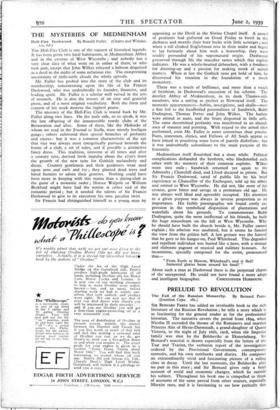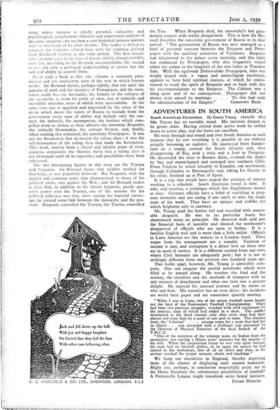PRELUDE TO REVOLUTION
The Fall of the Russian Monarchy. By Bernard Pares. (Jonathan Cape. t8s.) Snt BERNARD PARES has added an invaluable book to the rich literature of the Russian Revolution ; he tells a story which is as fascinating for the general reader as for the professional historian. The narrative covers the period from 1894, when Nicolas II ascended the throne of the Romanovs and married Princess Alix of Hesse-Darmstadt, a grand-daughter of Queen Victoria, to the night of July 16th, 1918, when th' Imperial family was shot by the Bolsheviks at Ekaterinburg. Sir Bernard's material is drawn especially from the letters of the Tsar and Tsarina, the verbatim report of the investigation ordered by the Provisional Government, contemporarY memoirs, and his own notebooks and diaries. He composes an extraordinarily vivid and fascinating picture of a ruling class in decay. Until the last moments, the Bolsheviks play no part in this story ; and Sir Bernard gives only a brief account of social and economic changes, which lie outside his subject. Throughout his book one is compelled to think of accounts of the same period from other sources, especiallY Marxist ones, and it is fascinating to see how perfectly this
story, whose interest is chiefly personal, subjective and psychological, complements objective and impersonal analyses of the same situation ; we see how a vast historical process mirrors itself in the minds of its chief victims. The reader is driven to conip ire the evidence tffered here with the evidence derived from Bolshevik sources in the same period. The first reveals utter incompetence in the face of events, which, though terrible, were not, according to Sir Bernard, uncontrollable; the second re .ea s not only a profound understanding of events but the will and ability to control them.
From such a book as this one obtains a curiously para- doxical and yet satisfactory view of the way in which history works. Sir Bernard claims, perhaps rightly, that not until the autumn of 1916 and the ministry of Protopopov, did the revo- lution really become inevitable; the history of the collapse of the monarchy is, from his point of view, one of imbecile and incredible mistakes, none of which were unavoidable. At the same time one is appalled and impressed by the sense of the doom which drove the rulers of Russia to exclude from the government every man of ability and include only the cor- rupt, the imbecile, the incompetent, the instinct which com- pelled them to choose as their advisers the demoniac Rasputin, the imbecile Goremykin, the corrupt Stiimer, and, finally, when nothing else remained, the nonentity Protopopov. It was not the Revolution that destroyed the ruling class ; it was the self-destruction of the ruling class that made the Revolution. This book, written from a liberal and idealist point of view, confirms completely the Marxist thesis that a ruling class is not destroyed until all its capacities and possibilities have been exhausted.
The two dominating figures in this story are the Tsarina and Rasputin. Sir Bernard shows that neither worked for Germany, as was popularly believed. But Rasputin, with the insight and common sense that characterised so many of his political yiews, was against the War ; and Sir Bernard makes it clear that, in addition to his almost hypnotic, purely per- sonal power over the Tsarina, one of the reasons for his political influence was that, alone among the imperial entour- age, he created some link between the monarchy and the pea- sants. Rasputin controlled the Tsarina, the Tsarina controlled the Tsar. When Rasputin died, the monarchy's last para- doxical contact with reality disappeared. This is how Sir Ber- nard describes the autocratic government of Russia in its final period. " The government of Russia was now managed as a kind of personal concern between the Emperor and Proto- popov with the auxiliary assistance of Vyrubova. Rasputin had telephoned to the palace every morning, and this habit was continued by Protcipopov, who also frequently visited either the palace -or the hospitals of the two ladies at Tsarskoe Selo. With the eqtiivocal Dobroyolsky Protopopov, who was deeply tinged with a vague and unintelligent mysticism, appears to have held spiritual seances, at which he endea- voured to recall the spirit of Rasputin and to back with this his recommendations to- the Empress. The Cabinet was a thing apart and of no . consequence. Protopopov did not always even attend its meetings. . . . To this had sunk
the administration of the Empire." GORONWY REES.











































 Previous page
Previous page